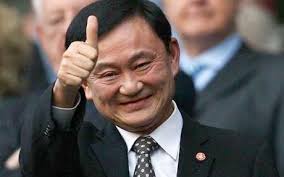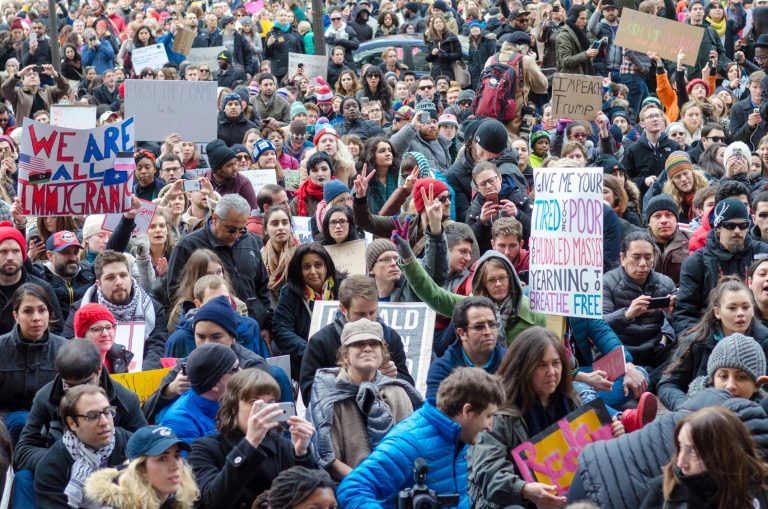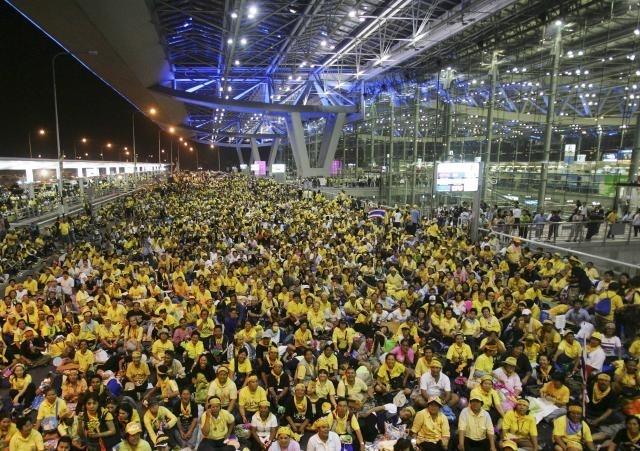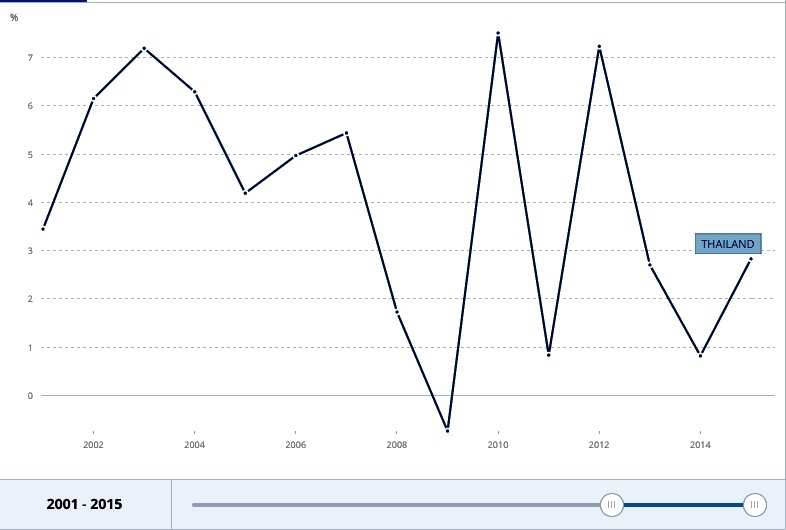When Businessmen Rule the State
By: Kara Tan Bhala
Striking parallels between two billionaire businessmen heads of state, now exiled Thaksin Shinawatra and Donald Trump.
Part 3 of SPI’s Trump Financial Ethics Watch Series
“If you monitor what Donald Trump is saying, he’s bluffing, the man. That’s really the culture of a businessman.” While there is “some similarity” between [us], [our] personal attitudes “may be not the same”. “But the cultures are very similar, the culture of a businessman”.[1]
Thaksin Shinawatra, Financial Times
Thaksin Shinawatra: Billionaire Businessman Turned Politician
Thaksin Shinawatra was elected as prime minister of Thailand in 2001. He was a businessman billionaire who made his vast fortune in telecoms. Espousing populist views, he cynically seized political advantage of economic inequality and disaffection in Thai society, exploiting class differences between the educated, wealthy, urban citizens and the less educated, poor, rural voters thus engineering the polarized demographics that have so harmed Thailand. He campaigned as a CEO leader, capable of solving national problems swiftly and effectively. In office, Thaksin was an authoritarian relying on anti-establishment rhetoric who, disparaged the press and alienated Western governments and liberal public opinion, rubbing his enemies’ noses in it with glee.[2] Thaksin believed he could resolve the sorry problems plaguing Thailand and its society for decades, simply by the force of his new ideas and his CEO like decisive actions. So far, so familiar but the ending for Thailand is SAD!
Yet the similarities in style and policies of Thaksin and Trump documented below do instruct and caution us against inflated expectations of businessmen being effective political leaders.
During Thaksin’s rule, divisions within the country’s polity progressively hardened as he fired up his supporters and denounced his detractors. The country split into two groups: the passionate supporters of Thaksin nicknamed the Red Shirts for their proclivity towards garments of that hue, and the equally ardent anti-Thaksin voters or Yellow Shirts, also appropriately color clad.
To be sure, Thaksin’s supporters had much to cheer under his rule. Unlike the Trump administration (so far), Thaksin’s administration helped the poor with a cheap universal healthcare program, a micro-credit scheme for those in subsistence-level poverty, and an infrastructure build-up to the benefit of the country. The poor adored him and subsequently re-elected Thaksin in 2005. However, the country’s establishment and progressives despised him, a situation he reveled in and did little to ameliorate. This anger spewed into regular, sustained and huge anti-Thaksin, Yellow Shirt public rallies that eventually led to economic disruption. Finally, in 2006 the military stepped in with a coup that sent Thaksin into exile in Dubai. The generals installed an establishment party, the Democrats, to power.
In 2008, the courts convicted Thaksin and his wife, in absentia, of a multi-million dollar property fraud. With this conviction, Thaksin was forced into a permanent form of exile because returning to Thailand would mean imprisonment. Remarkably, this legal inconvenience did not hamper Thaksin and the political party he founded, the Thai Rak Thai (Thais Love Thai) or TRT party. It won elections in 2011 under the leadership of Thaksin’s sister, Yingluck Shinawatra, a businesswoman with no political experience. Thaksin referred to Yingluck as his ‘clone’ and this was what many of those who voted for her wanted to hear. Not surprisingly, she struggled as prime minister but her greatest mistake was a bill that would have delivered a broad amnesty for criminals associated with the political turmoil of the post-coup years. The opposition believed Thaksin masterminded this bill to get himself off his own criminal conviction and allow him to return to Thailand and eventual political power. After much disorder consisting largely of continued disruptive demonstrations by the Yellow Shirts and low-level violence, the generals took control again in 2014. General Prayuth, the army commander, suspended the constitution, and dissolved the senate. Thailand, to this day, remains under military rule. The population is even more polarized and there is talk of a Red-on-Yellow civil war.
The ending of this narrative that begins with Thaksin’s rule is not predictive of the rule of every billionaire businessmen. Yet the similarities in style and policies of Prime Minister Shinawatra and President Trump documented below do instruct and caution us against inflated expectations of businessmen being effective political leaders.
Divisiveness
“[S]ome people divided their social circles into two distinct groups, carefully avoiding situations in which the different viewpoints might mix and clash.”
Thaksin was a divisive leader. He did little to reach out to his opponents believing he had the mandate of his supporters to pursue his brand of policies, especially economic nationalism. The Red Shirts make up Thaksin’s ‘base’ and largely comprise the economically disadvantaged of Thailand. They are farmers and other rural citizens, mainly from the north and north-east of the country, long suffering in their invisibility from the establishment elites. Red Shirts also come from the precarious classes in the urban areas, workers with much reduced bargaining power in the era of globalization, labor surplus and technological advancement. They are the unemployed and the non-wage earners in the informal sector of the economy. This side of the demographic was loyal to Thaksin and grateful for policies such as the universal healthcare system. The Red Shirts formed a political movement calling themselves the United Front for Democracy Against Dictatorship (UDD).
On the other side of the polity are the power elite, the urban middle classes and the business establishment. Their supporters, the Yellow Shirts, were just as assertive and vocal as pro-Thaksin factions. The loose grouping of royalists, elites and the urban middle class formed into the People’s Alliance for Democracy (PAD), utterly opposed to Thaksin. Yellow Shirts were behind the huge street protests that led up to the military coup of September 2006. The powerful group accused Thaksin of corruption and abuse of power. Tens of thousands of people protested in the streets and shut down the capital, Bangkok. Political deadlock resulted and the military ousted Mr. Thaksin in 2006.
Not unlike the US, Thailand’s wide political divisions are reflected on a micro level. Families, marriages and friendships are undermined by the political conflict. According to Duncan McCargo who writes on Thai politics, “[S]ome people divided their social circles into two distinct groups, carefully avoiding situations in which the different viewpoints might mix and clash.”[3] Compare this statement with a New York Times article on how political divides split relationships so that: a social worker in Spokane, Washington called off Thanksgiving with her mother and brother; a software engineer from Boulder, Colorado, canceled Christmas with his family in Texas; and a software designer in Chicago decided to move her wedding so her fiance’s grandmother and aunt, strong Trump supporters from Florida, could not attend. The Times article concludes, “…as the cultural divide becomes deeper, fewer Americans cross it.”[4]
Protests in US Against Trump’s Muslim Ban
Yellow Shirts Protest Against Thaksin
Denigrating the free press
Thaksin bullied his critics in the media, believing they were against him. At one point of his administration, a stalwart Thaksin supporter embarked on a hostile takeover of the leading Thai-language newspaper, Matichon, and the English-language newspaper Bangkok Post. Unsurprisingly, these two publications were often critical of Thaksin and his administration. This move was prefaced by the purchase of shares of the holding company of a stable of newspapers, The Nation, Krungthep Thurakit, and Khom Chat Luek, all of which were critical of the government, by the family of TRT’s secretary general. In the end, the takeover of Matichon and the Bangkok Post fell through as a result of the ensuing public outcry.
Thaksin made it clear that newspapers should carry little news about local politics but instead emphasize innovations and the development potential of countries. He discontinued his weekly press conferences at Government House saying they were of no use. According to a Michael Nelson, a political science professor at Ubon Ratchathani University, from Thaksin’s perspective, “political decision- and deal-making should be confined to a small in-group of politicians and technocrats shielded from the public eye. The people are supposed to trust the word of their ‘leader’.”
Authoritarianism, Devaluing Democracy
“Democracy is a good and beautiful thing, but it’s not the ultimate goal as far as administering the country is concerned.”
To his opponents and many outside observers, Thaksin’s bellicose approach in office threatened the young democracy. Nelson says Thaksin centralized personal power and did not accept the democratic rules of the game. Thaksin opined, “Democracy is a good and beautiful thing, but it’s not the ultimate goal as far as administering the country is concerned.”[5] Rather, Thaksin worked at narrowing down the public political space and infiltrating constitutional checks and balances.[6] In his position as prime minister, he increased control of public access to information regarding the government’s performance.
His edicts include ordering the streets of Bangkok be scrubbed, new trees to be planted, and tens of thousands of homeless people, beggars, undocumented aliens, prostitutes and stray dogs removed from the capital before the gathering of world leaders for summits. If complaints were made about abuses of power, the Thaksin administration would harass various local and international human rights and social activists. Thousands of people lost their lives in Thaksin’s infamous “war-on-drugs” that took place in the early part of his administration.[7] The police were permitted to shoot anyone whom they suspected of being a dealer. Thaksin claims he did not mean what he said about urging the police to deal with the drugs trade ruthlessly. He says his style is to bluff.[8]
Thaksin carried the obsessive, aggressive and ruthless tactics of the business tycoon into politics. The ideas he learned in “new management” was centralist and authoritarian, and fundamentally incompatible with democratic governance.[9] His business background meant he had no time for the “dry” version of market economics. He had a passionate conviction the role of government was to support business, believing if business was allowed to get on with the job of making money, actively backed by government, the people would benefit.
Corruption
Thaksin ousted Thailand’s Auditor General. Trump fired the FBI Director.
The widespread perception was that Thaksin stacked government agencies, the senate and the judiciary with his allies. Newspapers exposed the corruption in the acquisition of CTX luggage scanner machines bought for the new Bangkok Suvarnabhumi airport. The opposition took up this issue in a no-confidence debate against Transport Minister Suriya Jungrungreangkit. He barely survived the parliamentary attack and subsequently lost his portfolio in the cabinet. Thaksin ‘demoted’ him to the position of minister of industry and the concurrent position of the deputy prime minister.
The CTX scandal and other irregularities were never transparently explained to the public. Instead, the government defended its actions rather than impartially investigating the matter.
Further, Thaksin allegedly colluded with friendly senators, the house speaker, and constitutional court judges to oust the Auditor General, Jaruvan Maitaka, out of her position. She was persistently investigating doubtful dealings and irregularities of government acquisition practices at the new airport. In similar vein, Trump fired FBI Director James Comey on May 9, 2017. At the time of his firing, Comey was energetically leading an investigation into the Trump 2016 presidential campaign’s possible collusion with Russia to influence the election outcome.
Thaksin filled a new National Counter Corruption Commission was filled with people close to the Thaksin regime. Such maneuvers led the Bangkok Post (December 23 2005) to declare, “cronyism and corruption have been allowed to flourish under this government.” Nelson says the situation got so bad that observers simply assumed benefits of government spending and other conflicts of interest would benefit cabinet members, their wide circles of family members and friends at the national, provincial and local levels.[10]
Just as Donald Trump kept promising to “drain the swamp” by, for example, “instituting a 5-year ban on all executive branch officials lobbying the government after they leave government service,”[11] Thaksin also promised he would “scrutinise his Cabinet and clear out members accused of being involved in corruption.”[12] As with Trump’s swamp draining promise, Thaksin’s assurance of eliminating corruption was depressingly unfulfilled.
Nepotism and Conflicts of Interest
Thaksin’s wife, Pojamarn was the single most important financier of the TRT party as well as the owner of the party’s headquarters. She was instrumental in helping with the cabinet reshuffle after Thaksin’s re-election in 2005. According to The Nation, Pojamarn, who did not hold elected office or an administrative position, had undue influence on the administration, which steadily increased and was said to encompass the appointment and transfer of soldiers, policemen, the chief district officers and provincial governors.[13]
When a political opponent accused Thaksin’s younger sister of using an air force transport plane to bring friends to her birthday party and housewarming party in Chiang Mai, Thaksin responded by throwing a number of libel suits against his accuser. Nelson comments that this act of suing his opponent for a vast sum not only demonstrates Thaksin’s inflated sense of self-importance but also reflects revenge aimed at destroying an adversary – not one in Thaksin’s private life but a critic in the public sphere of a democratic nation.
Thaksin’s ultimate downfall came as a result of criminal charges brought against him. When Thaksin’s family sold his company, Shin Corporation, to the Singaporean government investment arm Temasek at the beginning of 2006, it triggered allegations of tax evasion and other criminal activity. But in the eyes of the Thai people his greater offense was the sale of one of Thailand’s most important companies to a foreign power. The political tide turned against Thaksin, who was forced to call a snap election, later annulled by the courts. He faced months of street protests, and was finally ousted in a military coup in September 2006.
Treatment of Muslims
According to Imtiyaz Yusuf, a Senior Fellow at Georgetown University’s School of Foreign Service, the problems in southern Thailand result from “decades of economic neglect, lack of employment opportunities for the local Muslims, cultural insensitivity of the bureaucracy and the non-recognition of the religious, linguistic and cultural diversity within the Thai polity.”[14] There are Malay Muslims in southern Thailand who consider themselves a distinct ethno-religious group and fear assimilation into Thai Buddhist society because in their minds, assimilation means loss of religious identity. Thai governments prior to the Thaksin administration undertook several efforts to accommodate its Muslim population into the mainstream. These efforts resulted in many Muslims in Thailand identifying themselves as “Thai Muslims”. However, there are still sections that see themselves differently in ethno-religious terms. These Muslim segments of society do not want to lose religious and ethnic autonomy, nor do they want to be part of the Buddhist infused Thai culture.
When he came into office, Thaksin launched a brutal campaign against Islamic insurgents in southern Thailand. According to McCargo, Thaksin regarded complex social and political problems – ranging rom drug abuse to low-intensity conflict – as manifestations of criminality, which could be solved by firm law enforcement.[15] He began putting pressure on the existing security structures soon after becoming prime minister, making it clear he expected quick results.
In October 2004 in the town of Tak Bai scores of Thai Muslims died in army custody. Security forces killed seven demonstrators during a protest, which became violent. Then, after police and soldiers rounded up and arrested scores of other protestors, another 78 died of suffocation after they were herded into army trucks and driven to a military camp 150 km away. The incident occurred six months after 32 suspected insurgents were killed when Thai security forces stormed a mosque in Pattani, where the rebels were hiding out. These two events re-ignited a separatist insurgency that started in 1960s but had simmered down. The Tak Bai incident occurred during Thaksin’s rule. Indeed, some Muslim media referred to Thaksin as the “Butcher of Bangkok” who avoided use of democratic means to resolve the conflict.[16] He was keen to show his toughness against Muslim insurgents but his approach only inflamed the volatile situation. Prior to Thaksin, the Southern Border Provinces Administrative Center (SBPAC), a task force comprising of civilians, military and the police, played a crucial role in offering a forum for dialogue between the locals and the authorities. Thaksin dissolved the task force, removing a major apparatus for resolving conflicts, building trust and encouraging cooperation between local Muslims and the authorities.
Thailand Post-Thaksin
Thailand’s GDP growth was robust during the Thaksin years, expanding 44 percent between 2001 and 2005, propelled largely by heavy government spending, low interest rates, increasing world trade and strong global growth. According to the World Bank, from 2000 to 2005 the proportion of Thais living in poverty dropped from 21 percent to 11 percent of the population.[17] Household debt rose 53 percent between 2001 and 2004.
The economy did not immediately suffer following the 2006 coup that expelled Thaksin from power. However, in 2007 investor confidence dropped because of doubts about the handling of the economy political trouble protests, bombings and the coup. Large-scale antigovernment demonstrations erupted in 2006, 2008 and 2010. Economists reckon the demonstrations led to economic disruptions as well as discouraged investments into the country. The violent protests in April and May of 2010 left 91 dead and 1,900 injured. The country remains under military rule.
Thai GDP Growth 2001-2005 (World Bank)
About Thaksin Shinawatra
Thaksin comes from a line of ancestors who immigrated from China. He grew up in the northern Thai city of Chiang Mai, where his father was a businessman and member of parliament. He joined the police and then won a scholarship to study criminal justice at Eastern Kentucky Universiy in the US.
Thaksin became fabulously wealthy by securing a series of government awarded mobile phone and communications-related concessions. His wealth increased greatly following the 1997 economic crisis because he transferred most of his assets into US dollars immediately before the devaluation of the Thai baht – a move many suspect that was precipitated by a tip-off. His company is called Shin Corporation and it became Thailand’s leading telecommunications giant almost overnight. Thaksin like Trump, flaunts his wealth as an important part of his aspirational pitch, even after Thai authorities seized 46bn baht ($1.3bn) over the criminal case against him.
Thaksin remains exiled from Thailand but has houses in at least six countries and travels on a Montenegrin passport.
-x-
[1] https://www.ft.com/content/59d81f90-e5e7-11e5-a09b-1f8b0d268c39
[2] Richard Lloyd Parry. “The Story of Thaksin Shinawatra” The London Review of Books, Vol. 36, No. 12 (19 June 20) https://www.lrb.co.uk/v36/n12/richard-lloydparry/the-story-of-thaksin-shinawatra
[3] Duncan McCargo. “Thai Politics as Reality TV” in The Journal of Asian Studies, Vol. 68, No. 1 (Feb, 2009), pp. 7-19. http://www.jstor.org/stable/20619668
[4] https://www.nytimes.com/2016/11/16/us/political-divide-splits-relationships-and-thanksgiving-too.html
[5] https://www.lrb.co.uk/v36/n12/richard-lloydparry/the-story-of-thaksin-shinawatra
[6] Michael H. Nelson. “Thailand and Thaksin Shinawatra: From Election Triumph to Political Decline” in eastasia.at, Vol. 4, No. 2, (December 2005). https://www.researchgate.net/publication/236860860
[7] Pasuk Phongpaichit and Chris Baker. Thaksin: The Business of Politics in Thailand. Chiangmai, Thailand: Silkworm Books, 2004.
[8] https://www.ft.com/content/59d81f90-e5e7-11e5-a09b-1f8b0d268c39
[9] Kelvin Rowley. “The Downfall of Thaksin Shinawatra’s CEO-state”, APSNet Policy Forum, November 09, 2006, http://nautilus.org/apsnet/0634a-rowley-html/
[10] https://www.researchgate.net/publication/236860860
[11] https://www.donaldjtrump.com/press-releases/trump-pledges-to-drain-the-swamp
[12] https://www.researchgate.net/publication/236860860
[13] https://www.researchgate.net/publication/236860860
[14] Imtiyaz Yusuf. “The Southern Thailand Conflict and the Muslim World” in Journal of Muslim Minority Affairs, Vol. 27, No. 2, (August 2007), pp 319-339. http://www.tandfonline.com/doi/abs/10.1080/13602000701536232
[15] Duncan McCargo. “Thaksin and the Resurgence of Violence in the Thai South” in Critical Asian Studies, Vol. 38, No. 1 (2006), pp 39-71. http://www.polis.leeds.ac.uk/assets/files/Staff/mccargo-thaksin-cas-03.06.pdf
[16] Imtiyaz Yusuf. “The Southern Thailand Conflict and the Muslim World” in Journal of Muslim Minority Affairs, Vol. 27, No. 2, (August 2007), pp 319-339. http://www.tandfonline.com/doi/abs/10.1080/13602000701536232
[17] World Bank Thailand Economic Monitor April 2006. http://documents.worldbank.org/curated/en/606211468308954012/Thailand-Economic-Monitor





